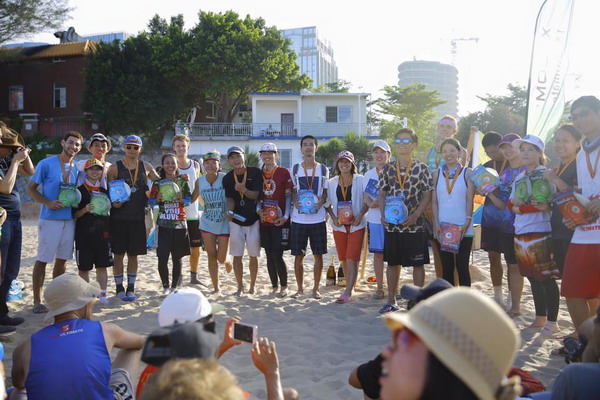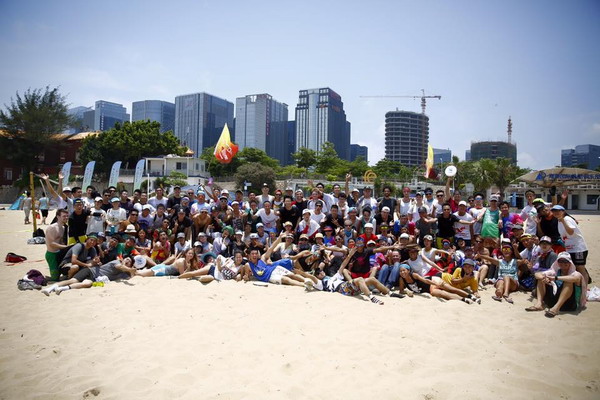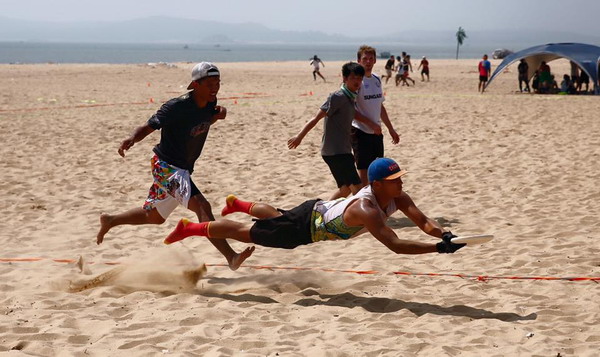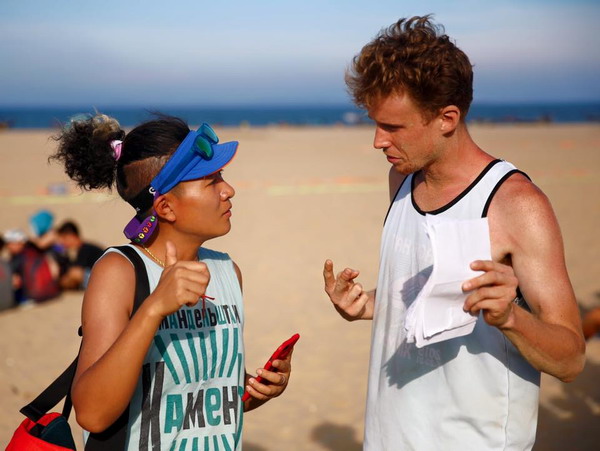

“You are what you love.”
These were the words printed in bold white letters on my friend Kevin’s athletic shirt. I read them as I waited for the next point to begin. Set upon a black tank top which featured a stylish psychedelic Jackson-Pollackesque design, they captured the sentiment of the weekend perfectly. Across the beach-turned-frisbee-pitch stood a Chinese high schooler from Shanghai named Tigger who was easily 195 centimeters tall and could have made the A-team of many top level University teams in America. Tigger is a member of the same team as the daughter of my friend Andrew, an American businessman living in Shanghai who, like me, spends the occasional weekend playing Ultimate Frisbee.
 |
| After each game, players line up and congratulate the other team on a well-played game. |
Apparently, there are at least three high school teams in Shanghai alone (that I can recall Andrew rattling off while we waited to begin our next point). Without a doubt, Ultimate Frisbee has come a long way since its humble beginnings in 1960s America. This weekend on the Guan Yin Shan Beach in Xiamen, that history continued to grow with the first annual Xiamen Beach Hat Tournament.
In this inaugural tournament, nine total teams were generated. I use the term “generated” because during a hat tournament the pool of players attending the tournament is ranked by skill and then one-by-one assigned to teams. The sole purpose of which is to create teams with similar levels of competitiveness. This is different from an open tournament, where pre-existing teams compete against one another. From a quality-of-play perspective, this means that a hat tournament typically features a significantly greater parity between competing teams while during an open tournament; the reputation of a team is at stake.
 |
|
After the tournament, 1 male and 1 female are selected from each team for displaying the best spirit of the game. These players are often awarded what is known as a spirit trophy. |
From a quality-of-life perspective, though, this can mean so much more. Teams in hat tournaments are generally far more diversified than the ones that appear in open tournaments. My team alone featured players from Hunan, Xiamen, Guangzhou, Hong Kong, Ningbo, Chengdu, France, and America. Many players (mine included) were meeting each other for the first time at this tournament as team mates to work together towards two common goals: Have fun, and win the tournament. At the risk of sounding overly sentimental, that sort of instant comradery is what this sport is all about.
You see, Ultimate Frisbee (or “Ultimate”, if you want to avoid using the brand name “Frisbee”) is a sport that encourages honesty and fair play. There are no referees in Ultimate, so all rule-enforcement is performed by the players on the field. At times it can be a headache, as the incidence rate is seemingly correlated to the perceived benefit of an opportune foul-call.
That being said, Ultimate isn’t a sport for cheaters. Far from it, Ultimate forces us to overcome our more primitive inclinations. We must confront some of our most base human emotions, our greed for victory being among them, with little more than the desire to be better, more honorable human beings.
 |
| Group photo, 2015 Inaugural Xiamen Beach Hat. |
It’s easy to fall victim to the temptation to draw a foul in football when it’s up to a referee to decide if you deserve a penalty kick or not; it’s something else entirely to cheat in a sport where no one can stop you. I believe that this small difference is a very massive reason why Ultimate Frisbee deserves to be considered one of the greatest growing sports in the World today. Simply, it makes you better.
In terms of growth, the numbers are as impressive as the sport itself. In 2012, there were an estimated 25 teams playing in China. However, according to the representatives at X-Com, China’s premiere provider for all things Ultimate Frisbee related, today there are well over 100 teams comprised of some ten thousand players- some individual teams, such as University of Nottingham at Ningbo’s team “UFO”, feature several hundred players. If the statistics are even proximate to the reality, it still represents an increase of over 100% year-over-year!
 |
| Ivan Xu from Shanghai makes a lay-out catch for a score. |
And it’s hardly difficult to see why Ultimate Frisbee is blending so well here in China. It fits a much needed niche which was previously absent in the Chinese sporting arena.In terms of international acclaim, Ultimate pales in comparison to sports such as Basketball, Football, and Gymnastics, where players are chosen from an early age and groomed to compete as uber-athletes at national levels. Due to this lack of national interest, the Ultimate Frisbee player base is that of players who have found a love for the sport deep within themselves.
The typical Ultimate player in China is not the product of an Olympic-medal machine. Rather,they are the weekend warriors living through ordinary weekdays looking for a splash of the extraordinaryafter they punch the clock for the week. They are the students, looking for an exciting way to decompress after hours of study (and perhaps, as is sometimes the case, an opportunity to meet members of the opposite sex in a low-stress environment). They’re also the people who left their motherland and have been fortunate enough to find their favorite pastime alive and well in a distant land. Regardless of their background, they are people who came together from all different walks of life to do something they love together.
 |
|
Wai Wai (Left) and William Shoemaker (right) were the primary organizers of the Xiamen Beach Tournament. The tournament featured 118 players and took place over two days. |
These players come outside of their spheres of guanxito forge new and completely undemanding friendships. What I enjoy most out of playing in China is the refreshing simplicity of the relationships I make with other players at tournaments. I like that no one feels inclined to awkwardly request selfies from me during a tournament- we’re too busy playing, and by the time we are all cheesing in front of a camera, it’s like we’re old friends who have known each other for years.
And that’s exactly what happened in Xiamen this weekend.
At the conclusion of the tournament, all nine teams stood drenched in sweat and baked by the summer sun. We gathered into a huddle of exhausted grins and stared enthusiastically at the event photographer, begging him to finish his job fast so that we could treat ourselves to a much needed shower. After he finished, players all around me began embracing. For some of the foreign players, it was their last tournament in China before they returned to their homelands, their flights no doubt made bittersweet by their departures from the family that they had found for themselves in the East.

About the author:
Keelan Bowker O'Brien is an American living in Fuzhou. In his free time he enjoys studying economics and teaching himself Chinese. He graduated from University of Delaware's Lerner College of Business in 2007 with degrees in Operation Management and Marketing with a focus in Quantitative Economics.